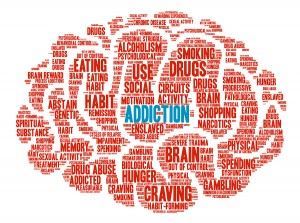Addiction – Causes, Types and Treatments
We’ve all heard the word addiction. At some point in our lives, many of us face it in some form or another. But just because it’s a common thing does not mean everyone understands addiction, its causes and why works the way it does. Those who have never experienced addiction sometimes struggle to empathize with those battling active addiction, not because they don’t care, but because they just don’t know what it’s like.
This is why taking the time to understand what addiction is, the types of addiction and the treatment options for addiction is so important. It not only allows you to empathize from a place of understanding, it gives you the tools you need to help those in your life who may be struggling.
What is addiction?
According to the National Institute on Drug Abuse, “Addiction is defined as a chronic, relapsing disorder characterized by compulsive drug seeking and use despite adverse consequences. It is considered a brain disorder, because it involves functional changes to brain circuits involved in reward, stress, and self-control. Those changes may last a long time after a person has stopped taking drugs.” Additionally, addiction is a treatable and preventable condition, much like other medical conditions, when the right treatment plan is found and adhered to.
Addiction works to rewire the brain and it reinforces itself – the brain is rewarded by a release of dopamine when the addictive behavior occurs, which registers as a pleasurable, good thing. Because the mind is naturally inclined to desire those rewarding things, the brain doesn’t immediately register that the addiction is damaging. It takes a self-aware mind to realize that the consequences of addiction cause severe harm.
What causes addiction in the first place?
No one wakes up in the morning and chooses addiction. Over time, the brain becomes wired to desire the addictive substance or behavior, but what causes this in the first place is somewhat relative.
One source says, “There are no substances (or activities) that universally or uniformly cause people to become addicted. And the vast majority of people exposed to most substances (or activities) considered addictive do not in fact develop addiction to them. Rather, a very complex array of cultural factors, social factors, and situational factors mingle with psychological factors, biological factors, and even personal values to influence the possibility of addiction.”
Another site addresses the question, “Is addiction genetic?” with compelling evidence of epigenetic changes: “. . . environmental factors, such as stress, induce epigenetic changes that can trigger the development of psychiatric disorders and drug addiction. Epigenetic changes refer to regulations of gene expression that do not involve alterations in the sequence of the genetic material (DNA) itself. Practically, epigenetic changes are information that is added on to already existing genetic material, but can affect the expression of genes.”
In other words, certain genes, certain environmental situations, certain mental health conditions and certain differences in personality can determine whether you are at higher risk for developing an addiction. At the same time, you are not predisposed to developing an addiction if your life has traits A, B or C – some people never develop an addiction even if these certain things are present.
Types of addiction
We are all familiar with alcohol and drug addiction to some extent. But addiction is more than just substance use – it is engagement in any behavior that is compulsive, unregulated and detrimental. Below, you’ll find a list of things people can be addicted to overtime:
- Alcohol;
- Drugs
- Methamphetamine;
- Cocaine;
- Cannabis;
- Opioids;
- Hallucinogens;
- Exercising;
- Food or eating;
- Gambling;
- Playing video games;
- Pornography;
- Pyromania;
- Sex;
- Shopping;
- Spiritual obsession;
- Tobacco;
- Using computers / the internet;
- Working.
For many, substance abuse is the most common form of addiction known and one that requires potentially extensive, intervening treatment. According to the current Diagnostic and Statistical Manual of Mental Disorders (DSM-IV) substance abuse is a diagnosable condition where one compulsive and repeatedly uses alcohol or other drugs despite problems related to use of the substance. Tolerance occurs, where the body requires more and more of the substance to feel the same level of pleasure, and withdrawal symptoms manifest when use suddenly stops.
But just because substance use is the most well-known form of addiction, it does not discredit the other addictions people battle and may need treatment for. Battling addiction is an exhausting, potentially life-long process of reorienting your life and learning strong self-control, healthy coping mechanisms and an increased sense of self-esteem to reduce relapse and boost mental health overall.
Treatment options for addiction
Because addiction is a severe physical and mental health condition, it’s important to recovery that not just the addiction is treated – any underlying mental health conditions that cause or feed off of the addiction need addressing as well. For this reason, when seeking an addiction treatment facility, look for ones which not only promise to help you create a personalized recovery plan, but will look after you beyond just the initial detox step.
If you’re struggling with addiction, directly or indirectly, and would like more information about treatment options. Contact us by calling Freedom Detox at (704) 486-5488 or visit our website to learn more about personalized treatment options for addiction.








